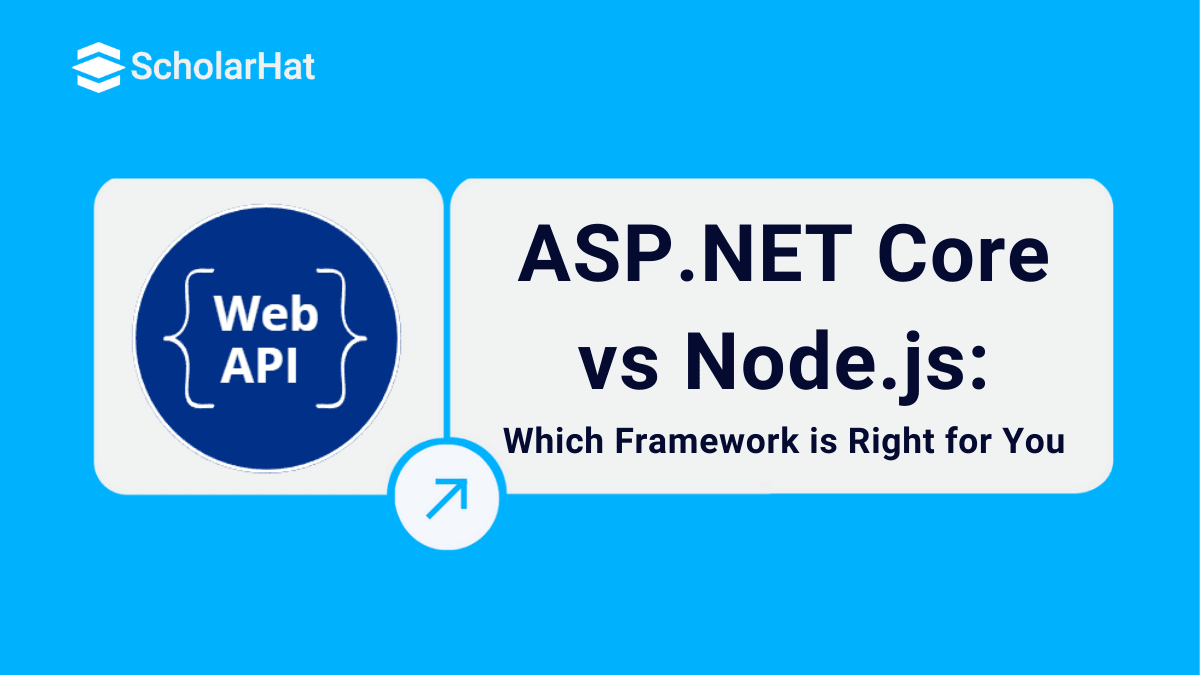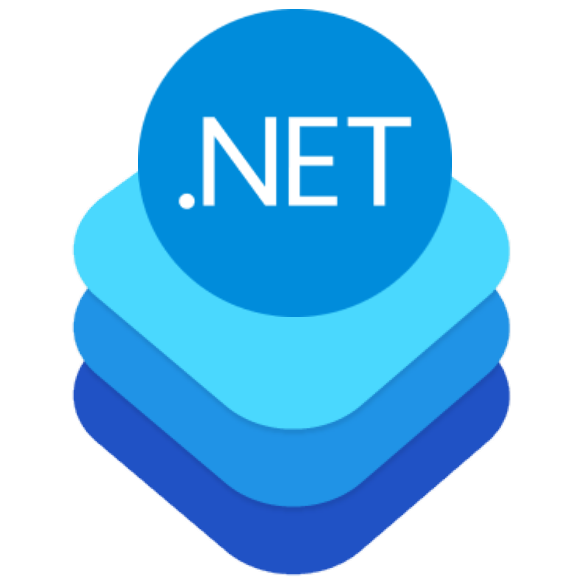18
AprNode.js Vs. ASP.NET Core: What to Choose?
Node.js Vs. ASP.NET Core
Node.js and ASP.NET Core are two tools for building websites. Node.js is fast and works well for handling many requests at the same time. It uses JavaScript, which makes it good for real-time features, like chat apps.ASP.NET Core uses C# and is great for making secure and powerful websites. It has helpful features to keep your code organized and safe.
In this ASP.NetCoretutorial, we will explore the difference between Node.js and ASP.NETCore.You will learn how to use Node.js for simple apps and how to use ASP.NET Core for strong, secure websites. Both tools are great for building your projects!
| Read More: Top 50 ASP.NET Core Interview Questions & Answers |
What is Node.js?
Node.js is a server-side JavaScript environment for developing web applications like ASP.NET, JSP, Php, etc. It is an open-source and cross-platform framework based on Google's V8 JavaScript Engine.
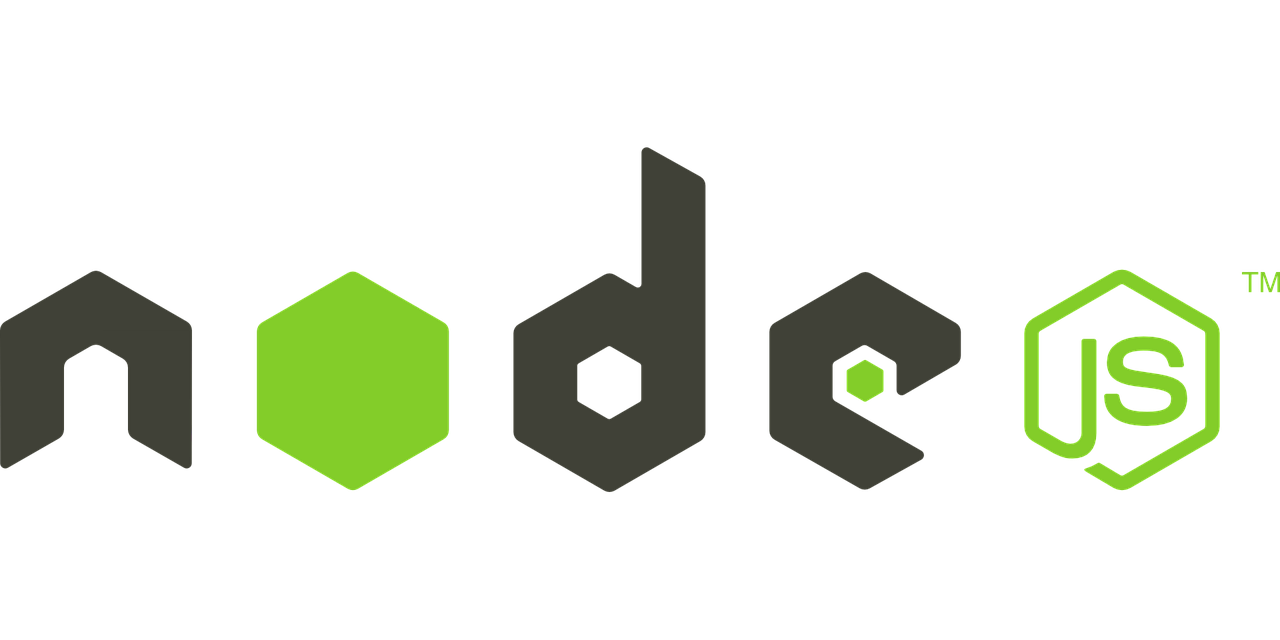
Node.js was developed by Ryan Dahl and other developers working at Joyent. It was first released in 2009, supporting only Linux. In 2011, the Windows version was released.
Node.js Essentials
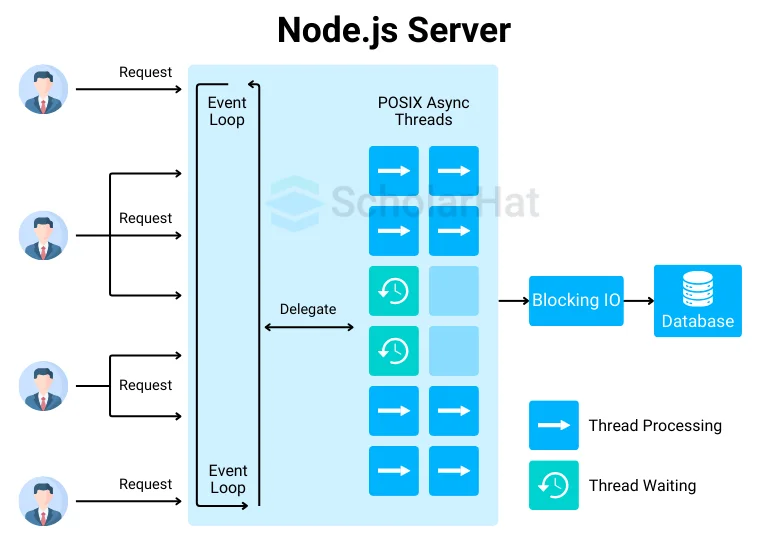
Node.js is a contemporary runtime for Chrome V8-based JavaScript. With it, developers can create high-speed and scalable networking applications using JavaScript on the server side. One of the unique advantages is the way it executes non-blocking I/O, providing the ability to handle several processes simultaneously without clogging the server. That is why Node.js turns out to be just perfect for real-time applications, such as chatbots and collaborative tools that need great speed and responsive features.
What is ASP.NET Core?
ASP.NET is a Web Development Framework developed by Microsoft. It is built on the .NET platform and provides many great features that help developers build dynamic and data-driven web applications and services. The best part is that it gives the developers the freedom to use a variety of programming languages.
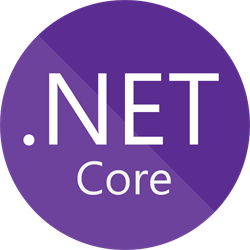
- ASP.NET Core thrives when it comes to developing cloud-based internet-connected applications such as web apps, IoT apps, and mobile backends.
- Its lightweight and modular design makes it an excellent choice for developers looking to create applications that can scale efficiently.
- Furthermore, it supports many development techniques, such as MVC and WebAPI.
- While learning ASP.NET Core, you should have basic knowledge of front-end development and backend development.
ASP.NET Core Essentials
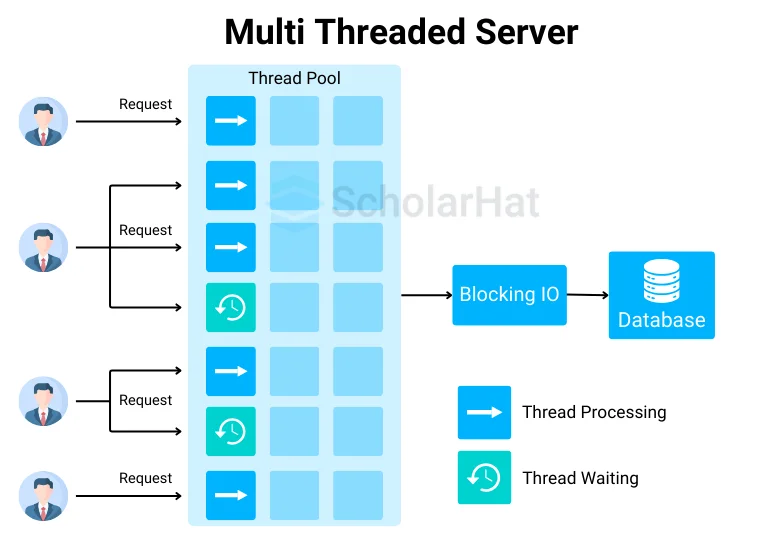
However, ASP.NET Core is a cross-platform framework for creating contemporary online apps. Among the many operating systems it supports are Windows, macOS, and Linux, among others. Because of its precise type, robust capabilities, and suitability for enterprise-level applications, C# is the foundation for ASP.NET Core developers. Integrated dependency injection, MVC architecture, and extensive security measures are just a few of its many features.
Performance Comparison: Node.js vs. ASP.NET Core
Speed and Efficiency
When it comes to speed, both frameworks have their strengths:
- Node.js thrives in I/O-intensive applications because of its non-blocking architecture. This helps it to handle queries more efficiently, resulting in speedier response times. Companies such as Netflix and LinkedIn use Node.js because of its capacity to handle a large number of simultaneous connections.
- ASP.NET Core, however, shines in CPU-intensive tasks. Its architecture is optimized for performance, making it capable of handling complex calculations and processing efficiently. Benchmark tests often show that ASP.NET Core can outperform Node.js in scenarios that require heavy computational resources.
Scalability
Scalability is another vital aspect to consider:
- Node.js is inherently scalable due to its event-driven nature, allowing you to handle multiple connections with ease. You can scale your application horizontally by adding more instances as your user base grows.
- ASP.NET Core also supports scalability, particularly when integrated with cloud services like Microsoft Azure. It offers built-in load balancing and resource management capabilities, making it easier to adapt to increasing demands.
Language and Ecosystem
Programming Languages
The programming language you use can make a big difference in your overall development experience:
- Node.js uses JavaScript, which a great number of developers already know; thus, the learning curve becomes easier, making collaboration much simpler. This is especially helpful for startups looking to quickly build their teams.
- On the other hand, C# used by ASP.NET Core boasts strong typing and object-oriented features, making it ideal for developers working on enterprise-level applications where structure and maintainability are paramount.
Package Management and Libraries
- Node.js features an extremely rich ecosystem through NPM (Node Package Manager), which provides numerous libraries and tools. This allows you to find solutions for almost any problem you encounter, speeding up development time.
- ASP.NET Core utilizes NuGet, offering a wealth of libraries tailored specifically for .NET applications. While both ecosystems are robust, NPM’s sheer volume of packages makes it an attractive option for developers looking for versatility.
Security and Reliability
Security Features
Security is a critical consideration for any application:
- ASP.NET Core has strong security features, including built-in authentication and authorization procedures. It promotes secure coding techniques and includes HTTPS out of the box, ensuring secure communication.
- Node.js, while versatile, demands developers to be more cautious about security. To get the same level of security that ASP.NET Core provides by default, you must follow best practices and use third-party libraries.
System Stability and Reliability
- One advantage of ASP.NET Core's dependability is that it is supported by Microsoft, which offers regular updates and ongoing maintenance. For enterprise applications that need regular performance, this dependability is essential.
- Although Node.js has a strong community that helps with its growth and stability, it might not have as much institutional support as ASP.NET Core. When working on projects that require ongoing maintenance, this distinction may be crucial.
Real-world Use Cases and Industry Adoption
Node.js in Action
Node.js has found its niche among startups and companies requiring real-time capabilities. Its asynchronous nature makes it ideal for applications like online gaming, chat services, and live data streaming. High-profile companies like PayPal and Uber rely on Node.js to handle their extensive user interactions efficiently.
ASP.NET Core in Action
ASP.NET Core is widely adopted in enterprise settings, where robust performance and security are paramount. Organizations such as Stack Overflow and Microsoft itself use ASP.NET Core for its scalability and security features. It is particularly effective for building enterprise-level applications that demand high performance and stability.
Making the Right Choice: Factors to Consider
1. Project Requirements
Contrast Node.js with ASP.NET Core. Deciding between your project needs for Node.js and ASP.NET Core: Node.js would be a good choice if your apps are heavy with real-time features or handle thousands of concurrent connections. In contrast, enterprise applications that prioritize security and performance could very well be aligned with the ASP.NET Core platform.
2. Team Expertise
Consider your team’s expertise as well. If your developers are more comfortable with JavaScript, transitioning to Node.js can be seamless. On the other hand, if your team has a strong background in C#, ASP.NET Core could be the more natural fit.
3. Long-term Goals
Consider your long-term goals for the application. Both Node.js and ASP.NET Core offer scalability. However, ASP.NET Core has more built-in capabilities that are designed for enterprise applications. Consider how your application may change over time to ensure that your selected framework can accommodate your growth.
Processing Models
1. Node.js
Node.js operates on an event-driven, non-blocking I/O model. This design makes it highly efficient for handling multiple requests simultaneously, allowing you to build fast, scalable network applications. It’s particularly effective for applications where quick interactions are crucial.
2. ASP.NET Core
ASP.NET Core follows a more traditional MVC architecture. This structure allows for organized code and clearer separation of concerns. It handles requests in a multi-threaded environment, which can be beneficial for managing multiple user requests effectively, especially in more complex applications.
Community Support
1. Node.js
There are a lot of tools available to assist you in solving problems and improving your development abilities in the lively and active Node.js community. As you overcome obstacles, the vast array of courses, forums, and open-source projects can be immensely beneficial.
2. ASP.NET Core
Strong community support for ASP.NET Core is largely attributable to Microsoft's support. Developers can more easily traverse the learning curve because of the framework's comprehensive documentation and active community, which shares best practices and solutions.
Cost Considerations
1. Node.js
For startups and smaller companies, Node.js can be cost-effective. Its open-source nature minimizes licensing costs, and many hosting options are affordable. If you’re working with a tight budget, Node.js can be an attractive choice.
2. ASP.NET Core
While ASP.NET Core might have higher infrastructure costs, particularly for enterprise-level applications, the benefits it provides in terms of performance and security often justify the investment. The potential for improved productivity and reduced long-term maintenance costs can make ASP.NET Core a wise choice.
Difference between Node.js and ASP.NET Core
Here’s a comparison table for Azure SQL Database and Azure Cosmos DB, written in a similar format:
| Feature | Node.js | ASP.NET Core |
| Language | JavaScript (or TypeScript) | C# (primarily), F#, VB.NET |
| Platform | Cross-platform (Windows, macOS, Linux) | Cross-platform (Windows, macOS, Linux) |
| Performance | Excellent for I/O-bound applications (event-driven) | High performance, especially for CPU-bound tasks |
| Framework Type | Single-threaded, non-blocking I/O model | Multi-threaded, asynchronous model |
| Development Environment | Lightweight with extensive open-source packages (npm) | Rich IDE support (Visual Studio, VS Code) |
| Ecosystem | Huge npm package ecosystem, commonly used in JavaScript applications | Strong integration with .NET libraries and tooling |
| Hosting | Lightweight hosting (e.g., on Node.js servers) | Microsoft IIS, Azure, Docker, Kestrel (default) |
| Use Cases | Real-time apps (chats, games), APIs, microservices | Enterprise-grade applications, APIs, microservices |
| Concurrency Model | Asynchronous, non-blocking event loop | Asynchronous with Task-based parallelism |
| Scalability | Horizontal scaling with Node clusters | Horizontal scaling, cloud-ready with microservices |
| Learning Curve | Easier for developers familiar with JavaScript | Steeper for beginners but easier with C# knowledge |
| Security | Manual security implementation (libraries like Helmet.js) | Built-in security features (Identity, Authentication) |
| Maturity | Established for modern web development | Well-established in enterprise and cloud solutions |
| Deployment | Simple deployment with Node Package Manager (npm) | Supports flexible deployment (on-premises, cloud) |
Summary
The choice between ASP.NET Core and Node.js depends on the specific needs of your project and the skills of your team. Node.js is the greatest choice if you want to create high-concurrency real-time applications. It is great for assignments with tight deadlines and allows for rapid development thanks to its JavaScript core.
Become an expert in building powerful web applications. Enroll in our ASP.NET Core Certification Training at ScholarHat and start building real-world projects.
FAQs
Take our Aspnet skill challenge to evaluate yourself!

In less than 5 minutes, with our skill challenge, you can identify your knowledge gaps and strengths in a given skill.


